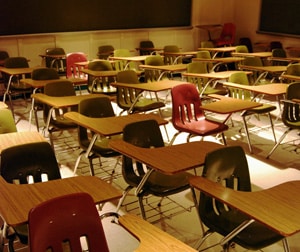
Photo by sidewalk flying/flickr.com
Public Education has long been a “soft” target for political opportunists on both sides of the aisle. Why? Because it is especially vulnerable, difficult if not impossible to properly quantify and defend. Anyone who thinks that test scores alone measure academic achievement is seriously misinformed.
Also, public attention to education manifests as either love or hate, bouncing between the two pillars usually in concert with the economy.
In a February 1980 article titled “Doomsday for Public Education,” political pundit James J. Kilpatrick cited yet another pundit (you could call this a “double dose” of punditry, I suppose), George Will, as predicting that, by 1990, “Public Education in the United States will have deteriorated beyond significant recovery.”
Kilpatrick went on to identify some of the causative factors contributing to the inevitable demise: the overblown structure of the “educational establishment,” the stifling influence of government (sound familiar?), and the U.S. Supreme Court. Both of the pundits identified incompetent teachers, teacher unions, court intervention in general and the educational bureaucracy.
Interestingly, The Economist of March 19, 2011 seems to echo most of the two pundits’ theses. So we can take it, I suppose, that in some peoples’ eyes, from 1980 to the present, public education has suffered the same ills, the same causative factors that should have led to its inevitable deterioration. On evidence, public education is remarkably resilient in spite of its pronounced shortcomings, evading one doomsday after another. The monster is such that society seems to have no choice but to complain while, at the same time, paying for it.
Considering for a moment the sheer number of “magic bullets” that have been proposed (and dodged) to save public education from itself, we must conclude the monster is bullet-proof.
Persistently gullible
Among the magic bullets proposed over the years are vouchers, magnet schools, charter schools, free schools, teacher and school grading, and so on – all of which (Yes! Just say it!) have failed to produce any significant long-term perceived or measurable “improvement” in the education of America’s children.
What has always amazed me has been the persistent gullibility of politicians and the public as they whip-saw one another from pillar to post trying to tame the beast. Can it be the case, really, that public education is impervious to politically satisfactory (that is to say, measurable) improvement?
I have to come to believe it is and, for as long as it exists, public education will remain a natural “soft” target for political demagogues of all stripes.
In fact, until public educators and teacher unions stop being their own worst enemies and own up to a few inconvenient truths (that are some bad teachers and bad schools) they will always remain in the crosshairs of political opportunists. Well, they probably will no matter what actually happens, but so it goes.
A question
Let me end this essay with a question. If you were a typical youngster in New Mexico, why would you believe disciplining yourself and getting a “good” education would lead you to a happy and prosperous life? Looking around at the world as you see it, hear it, and live in it on a daily basis, what out there would sufficiently motivate you to discipline yourself to study and to achieve in school?
I believe the foregoing may be unanswerable; nevertheless, it is a valid question, and one that must be confronted because it speaks to what is without doubt the most fundamental single force in education and instruction: motivation.
In my next essay I will discuss the simple truth that, absent the students’ motivating desire to learn, public education cannot succeed.
Emanuele Corso has been a New Mexico resident for over 30 years. Prior to that he taught at the University of Wisconsin-Madison in the Department of Educational Policy Studies, where he received his doctorate in education policy studies. He taught “Schools and Society” and “School Reform” to graduates and undergraduates. He holds two master’s degrees and a bachelor’s in mathematics. He is currently working on a book, “Belief Systems and the Social Contract,” which he started when he was teaching at Wisconsin.